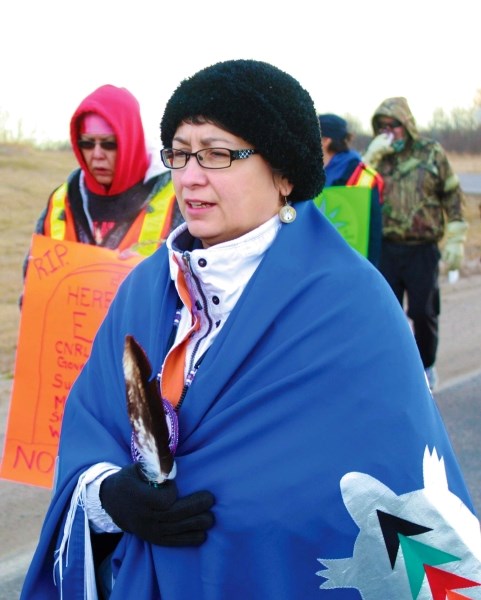An organizer of the Idle No More ceremonial walk held Oct. 26-28 from Cold Lake, to Bonnyville, to La Corey and back said they accomplished what they set out to do.
“We achieved our goal of creating more awareness of the ongoing CNRL oil spills and the effects industry is having on the land and water,” said Saddle Lake Cree Nation councillor and Idle No More organizer Shannon Houle. “We've raised awareness about what is happening in this region not only locally, but also nationally and internationally. Hopefully this encourages people to keep asking the tough questions about what we are letting happen to our environment.”
The morning of Oct. 26, about 30 people gathered at Casino Dene, just outside of Cold Lake, to begin the walk along Highway 28. Band members from Cold Lake First Nations and Saddle Lake Cree Nation, as well as members of Idle No More, Keepers of Athabasca and residents of Cold Lake joined the walk.
She said the group received “mixed feelings” towards the walk, as several people showed their support by joining the walk and passing along positive messages of support, while others felt inconvenienced by the slow-moving group.
“We understand there will be differing opinions, but the inconvenience of us slowing traffic on the highway is nothing compared to the inconvenience of not having drinking water,” said Houle, referencing the recent revelations that the bitumen releases on CNRL's Primrose site have likely contaminated groundwater aquifers.
She said although those taking part are “saddened” by the incidents on CNRL's leases, the walk was carried out in support of “Mother Nature and her four elements: water, land, air and sun” rather than as a protest.
“If we don't stand up for those (water, land, air and sun) we will soon destroy ourselves.”
She continued, “This affects everyone. It just happens that indigenous people are leading the way.”
Houle explained that the area affected the by the CNRL bitumen releases is within Treaty 6 area, and that “the ongoing destruction of the environment is a breach of that treaty.
“We have a right to live our lives according to our customs and values, which include living off the land and teaching from the land.”
She said the treaty agreements were agreed upon “to share the land. But the land is being conquered by industry.”
The walk, which Houle described as “tough and very trying”, came to a conclusion back at Casino Dene on Oct. 28, before the group gathered later that night at the Cold Lake First Nations Hall for a traditional ceremony and feast.



